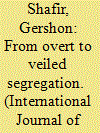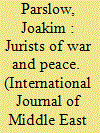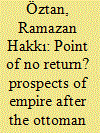|
|
|
Sort Order |
|
|
|
Items / Page
|
|
|
|
|
|
|
| Srl | Item |
| 1 |
ID:
158369


|
|
|
|
|
| Summary/Abstract |
This article's geographical focus is the Galilee, Israel's only region with a Palestinian Arab majority. Its sociological focus is the drive to Judaize this region, the mirror image of its de-Arabization, which I anchor in Israelis’ morbid fear of settler colonial reversal. Although direct legal discrimination—restriction of movement under a military government and exclusion from publicly administered land—was banned by the government and the High Court of Justice respectively, new modes of discrimination against Israel's Arab citizens have replaced the older forms. I demonstrate how policies that limit Arab middle-class citizens’ upwardly mobile migration into the Judaized spaces of communal settlements (or overlooks) and towns endure. I compare gatekeeping exercised by national-level indirect legal discrimination operating through the admission committees of communal settlements with the institutional discrimination practiced by municipalities of emerging mixed towns against new Arab residents’ public presence. Finally, I highlight the linkages between instances of Judaization across the Green Line, which make the unwinding of segregation, in all of its forms, that much harder.
|
|
|
|
|
|
|
|
|
|
|
|
|
|
|
|
| 2 |
ID:
158371


|
|
|
|
|
| Summary/Abstract |
The jurists who entered Turkish academia during the 1930s built the foundations of their discipline under a regime that became increasingly authoritarian as war drew closer. Like their peers in Italy and France, therefore, they had to produce coherent doctrines but also support the frequent use of exceptional emergency powers. How did they solve this contradiction? More importantly, what consequences did their solutions have for the use of emergency powers after the war? This article adopts a Deleuzian reading of two strategies with which Turkish jurists met that challenge, approaching their work not simply as theories about law but also as models for the role law should play in the articulation of public authority. Focusing on Ali Fuad Başgil and Sıddık Sami Onar, law professors at Istanbul University, I argue that although both professors supported the regime, only a situational doctrine of the kind Onar produced was capable of ensuring that jurists would have a place in the exercise of “exceptional” state powers after the 1950 transition to democracy.
|
|
|
|
|
|
|
|
|
|
|
|
|
|
|
|
| 3 |
ID:
158370


|
|
|
|
|
| Summary/Abstract |
The Kemalist leadership of early Republican Turkey attempted to transform the country's Muslim populace with a heavy emphasis on secularism, scientific rationalism, and nationalism. Several studies have examined the effects of this effort, or the “Turkish Revolution,” at the central and more recently provincial levels. This article uses first-hand accounts and statistical data to carry the analysis to the village level. It argues that the Kemalist reforms failed to reach rural Turkey, where more than 80 percent of the population lived. A comparison with sedentary Soviet Central Asia's rural transformation in the same period reveals ideology and the availability of resources as the underlying causes of this failure. Informed by a Marxist–Leninist emphasis on the necessity of transforming the “substructure” for revolutionary change, the Soviet state undermined existing authority structures in Central Asia's villages to facilitate the introduction of communist ideals among their Muslim inhabitants. Turkey's Kemalist leadership, on the other hand, preserved existing authority structures in villages and attempted to change culture first. However, they lacked and could not create the resources to implement this change.
|
|
|
|
|
|
|
|
|
|
|
|
|
|
|
|
| 4 |
ID:
158372


|
|
|
|
|
| Summary/Abstract |
In late 1912, the Ottoman imperial armies suffered a series of quick defeats at the hands of the Balkan League, comprising Greece, Serbia, Bulgaria, and Montenegro, resulting in significant territorial losses. The Ottoman defeat in the Balkan Wars (1912–13) often stands at the center of teleological accounts of a neat and linear transition from Ottoman Empire to Turkish Republic. These teleological readings see the Ottoman defeat as a historical turning point when Ottoman elites turned nationalist, discovered Anatolia, and embraced the Turkish core. This article contends that such approaches frame late Ottoman history in anticipation of the later reality of nation-states, and overlook the messy and historically complex nature of the collapse of empire and the emergence of the nation-state. Although the defeat was certainly shocking for the Ottoman ruling elite, I argue that it initiated an era of debate rather than one of broad consensus. Similarly, the defeat neither marked the end of the Ottoman Empire nor heralded the coming of the Turkish Republic, but rather reinvigorated the Ottoman imperialist project.
|
|
|
|
|
|
|
|
|
|
|
|
|
|
|
|
| 5 |
ID:
158373


|
|
|
|
|
| Summary/Abstract |
This article focuses on the writings and literary networks of the Egyptian intellectual and activist Sayyid Qutb during the late 1940s. Scholars have tended to explain Qutb's political radicalization and joining of the Muslim Brotherhood during the subsequent decade via aspects of his personality or personal life, such as his quick temper, conservatism, or frustration over unfulfilled aspirations to become a writer. Drawing on three periodicals published respectively by leftist, Islamist, and independent aspiring writers, I instead place Qutb's criticism of political, economic, and cultural elites in the context of an emerging generation of critical intellectuals. By shedding light on intellectual cooperation between Qutb, Muslim Brothers, Marxists, and independent writers, this article challenges established scholarly narratives that locate the Islamist project outside the Egyptian intellectual field.
|
|
|
|
|
|
|
|
|
|
|
|
|
|
|
|
|
|
|
|
|